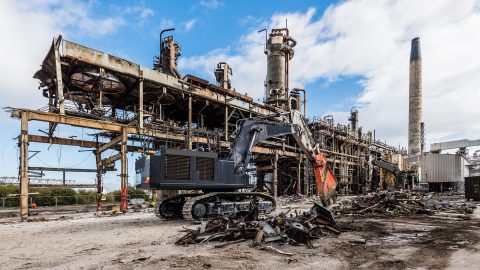Petrochemical manufacturing giant SABIC and engineering consultancy RVA Group have marked a decade of decommissioning works completed together, at the operator’s Wilton and North Tees sites in Teesside.
The projects represent over 1.2 million safe hours worked on the demolition of ten plant areas spanning 54.35 hectares – the equivalent of 134 football pitches.
Acting as demolition Principal Designer, RVA Group has safely specified and project managed 19 individual contracts during that ten-year period, working with six different contractors appointed to execute the works.
Assignments have included the demolition of the two largest distillation columns in Europe – at 110m high – plus an additional 25 columns, and three chimney stacks reaching up to 125m.
One hyperbolic and ten package cooling towers have also been cleared, along with 50 furnaces, six spheres and more than 100 storage tanks. Early in the project, the team demolished a jetty on the River Tees too – a notable location and focal point of environmental consideration, as the Teesmouth National Nature reserve is a Site of Special Scientific Interest (SSSI) and is home to protected bird and river species.
Despite the complexity of this vast undertaking and the sheer volume of work carried out since the relationship began back in 2012, the project has remained on track and has been delivered under budget.
Commenting on the project, RVA’s operations director Matthew Waller said: “This has been an intricate, extensive, and high-profile demolition programme – part of SABIC’s investment in ‘fit for the future’ operations. We have continued to sequentially remove redundant plant from their footprint to pave the way for their ongoing manufacturing excellence, and it has been a privilege to support them over the course of the last ten years.”
SABIC’s senior demolition manager Keiron Mulholland added: “The focus for this entire project, has been safe execution, by design. Detailed planning and expert decommissioning engineering have been the foundations for the safe delivery from start to finish – no mean feat given the inherently high-hazard nature of the works and the sheer number of hours invested into the programme.
“The team from RVA has undoubtedly played its part in helping deliver a successful project outcome. RVA’s project managers worked diligently and collaboratively with both the SABIC team and all of the Principal Contractors, to meet the project business drivers of an excellent EHS performance, within the sanctioned budget and in line with the agreed schedule – a marvellous achievement and one the RVA team should be very proud of.”
A staggering 58,500 tonnes of scrap have been salvaged for reuse or remanufacturing since the project began, with 44,000 tonnes of additional waste – including 8,750 tonnes of asbestos – managed responsibly in line with the waste hierarchy. The decade-long project has achieved a 98% recycling rate.
A four-figure-sum has also been donated to local charities during the decade, as part of an initiative recognising best practice safety observations.
Offering a concluding thought, RVA Group’s managing director Richard Vann said: “Quite often when we discuss long-term plans with a client, many factors influence whether they will ever be fully rolled out and completed, or not. Working with SABIC – a company that has remained so committed and focused to staying on track, over such a long period – has taught us a great deal about the importance of building secure relationships when navigating the good, and not so good, aspects of decommissioning project management. Thank you SABIC.”
The last of SABIC’s redundant assets on Teesside will be demolished and cleared by the end of 2023.
SABIC is one of the world’s leading petrochemical companies, operating in over 50 countries and employing more than 33,000 people worldwide. There are in excess of 380 people working for the organisation’s North-East operation – plus 400 contractors – which creates £400m for the local economy.









